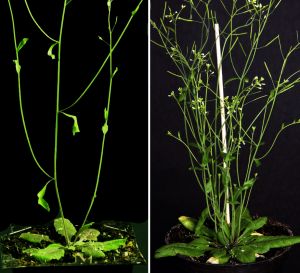Whether to form lateral branches or to grow vertically is a key decision in plant development, and a very important factor in agriculture. To optimize crop yield, depending on the type of crop, the farmer will prefer one option or the other.
Several factors involved in this process are already known, but the relationship between them was not. Researchers at the Centro Nacional de Biotecnología of the CSIC (CNB-CSIC) have now identified the chain of genes that controls the decision to form a branch from a lateral bud or to inhibit this bud while awaiting conditions more favourable for the plant. The study was published today in the journal Proceedings of the National Academy of Sciences USA.
"One of the most influential factors in this process is light. When days are short or when a plant is very close to other plants that shade it, the lateral buds remain dormant and the plant mainly grows upwards in search of more light,” explains Pilar Cubas, the study's lead author. “We already knew a gene (BRC1) involved in the inhibition of branching. We also knew that there is a hormone, abscisic acid (ABA), that prevents the development of lateral branches. We now understand the relationship between these factors. We've connected the dots."
According to the study, on days with few hours of light or when the plant is shaded by other plants, the BRC1 gene is activated and induces expression of three transcription factors that, in turn, cause an increase in NCED3, a protein responsible for synthesizing ABA. This chain of events causes ABA to accumulate in the lateral shoots of the plant, which prevents their growth and the development of branches.
"A direct relationship has now been identified between BRC1 and ABA in the regulation of the plant architecture," says Cubas. The work was done in Arabidopsis thaliana, a species widely used in research, but scientists think that these results could be extrapolated to other species of agricultural interest such as potatoes and tomatoes, whose branching patterns might be controlled.
"Knowing these molecular processes in detail is important for finding new strategies that allow us to regulate the growth of species of agricultural interest and to optimize crop yields," concludes the scientist.
- Eduardo González-Grandío, Alice Pajoro, José Manuel Franco-Zorrilla, Carlos Tarancón, Richard Immink and Pilar Cubas. 2017. Abscisic acid signalling is controlled by a BRANCHED1/HD-ZIP I cascade in Arabidopsis axillary buds. PNAS DOI: 10.1073/pnas.1613199114






